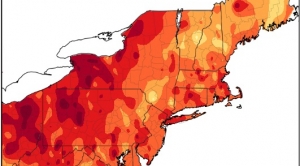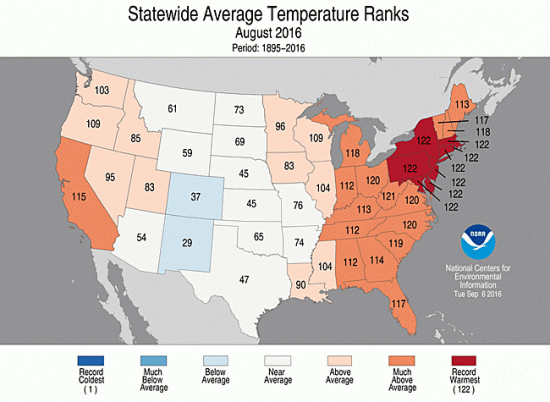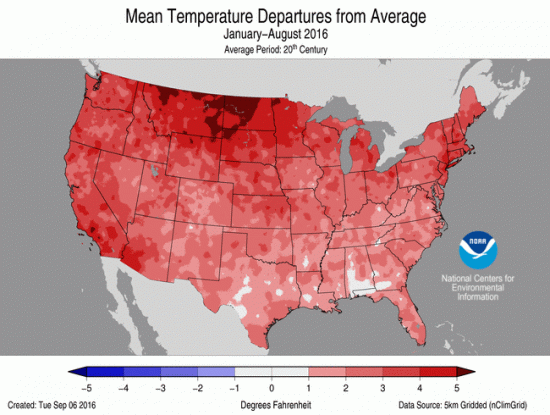With Andrea Thompson
The dog days of summer were especially hot across the Northeast and Mid-Atlantic last month, with eight states in those regions recording their warmest August in 122 years. Two of them — Connecticut and Rhode Island — also had record-warming summers, according to data released Thursday by the National Oceanic and Atmospheric Administration.
While abundant rainfall kept temperatures closer to normal across much of the country last month, the contiguous US still had its fifth-hottest summer on record and third-hottest on record.
Outside the Lower 48, Alaska continued its streak of stormy weather, with its third-warmest August and second-warmest summer in 92 years. So far, 2016 is by far the hottest year on record.
How each state's average temperature in the Lower 48 ranked for August.
Click image to enlarge. Credit: NOAA
The warm temperatures even for the summer come amid the world's hottest year by a wide margin, with temperatures by July falling close to 1.5°C (2.7°F) above pre-industrial levels. This benchmark has been discussed by international negotiators as a possible more stringent goal to limit global warming than the current goal of 2°C (3.6°F).
Thanks to a combination of weather and drought, much of the Northeast and Mid-Atlantic regions baked through August. Connecticut, Delaware, Maryland, Massachusetts, New Jersey, New York, Pennsylvania and Rhode Island all had records for the month.
THE “Bermuda Highbrought relatively warm and dry conditions to the region, NOAA climatologist Jake Crouch said in an email. Dry soils meant that less of the incoming sun's rays went to evaporating moisture, “allowing daytime temperatures to soar,” he said. Meanwhile, moisture in the atmosphere kept the heat indices high and led to higher overnight temperatures.
Several cities in those regions also topped the charts, including Buffalo, Bridgeport, Conn., Philadelphia, Boston and Wilmington, Del., according to Northeast Regional Climate Center. Both LaGuardia and Kennedy airports also recorded record hot Augusts, while Washington, DC had the second warmest.
RELATEDThe future of national parks will be much hotter
July makes 15 record hot months in a row
Only Connecticut, Rhode Island and California had record-warming summers. A relatively cool June in the Northeast and July heat that was largely confined to the coasts was why more northeastern states didn't see a record hot summer, Crouch said.
In California, record summer heat has helped fuel wildfires that have already charred tens of thousands of acres this year.
Overall, August ranked as the Lower 48's 17th warmest for August, thanks to near-normal temperatures across a wide swath of the interior. Those temperatures, in turn, were linked to rain in those areas that made the month the second-wettest August on record for the contiguous U.S.
“Precipitation in the Southwest, the Rockies, and the central US depressed temperatures, particularly daytime temperatures, and that lowered the overall US continuous average temperature,” Crouch said.
How temperatures in the contiguous US have differed from normal for the year to date.
Click image to enlarge. Credit: NOAA
Warmer temperatures across much of the country earlier in the season helped the summer overall tie 2006 as the fifth warmest on record for the Lower 48, measuring 2.1°F (1.2°C) above 20th century average, 71.4°F.
Averaged in August, the year-to-date temperature for the contiguous US is 2.8°F above the average of 53.9°F (12.2°C), ranking third warmest .
In Alaska, the theme of record and near record this year continued. It was the third warmest August for the state and the second warmest summer. Several spots — including Anchorage, Kenai, King Salmon and Yakutat — had their hottest summer on record.
Unbroken high temperatures give the border state its hottest year on record by 7.6°F (4.2°C).
Chances they favor above-average warmth across the Lower 48 as well as Alaska for the next three months, raising the possibility that Alaska will tie this record and that the US as a whole could have a top 5 hot year.
You may also like:
Scientists race to unravel an ice avalanche mystery
Louisiana floods are directly linked to climate change
Here's what China and the US pledged on climate





